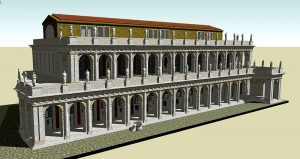How can digital tools help historians make sense of the Ottoman world, with its 25 languages, 8 alphabets, and a timespan of over 600 years? This is the question posed by the Digital Ottoman Platform (DOP) project, a collaborative effort of scholars working to create, among other resources, a gazetteer of the Ottoman world. The gazetteer will be “an essential tool for studying social and spatial networks in the Ottoman realm.”
“Creating a Digital Gazetteer of the Ottoman World” will be presented as part of a panel on computational approaches to premodern Asian history at the AHA annual meeting in Denver next month. Taking networks as its organizational theme, the panel will cover topics that include social networks in 13th-century China, the intellectual history of the civil service in early modern Korea, and the maritime history of East Asia.

A 3D model of the basilica Aemilia in Rome, Italy, by artist Lasha Tskhondia. Explore how historians can use 3D modeling at AHA17. Wikipedia Commons
But to a great extent it is digital methodologies that are on display in digitally focused panels this year at the annual meeting. So, if you’re curious about 3D modeling or techniques for spatial history, there are papers from a range of different temporal and geographical contexts—from mapping and modeling medieval history to housing segregation in 19th-century US cities to many more from beyond the boundaries of the United States and Europe.
A number of panels and papers ask questions about how digital methodologies influence the stories we tell about historical change. As Laura Putnam wrote in the American Historical Review earlier this year, “That so many of us are now finding and finding out via digital search has significant consequences.” So whether you’re a digital historian or not, panels that explore the impact of digitization and digital exploration on our work would be good choices to put on your meeting itinerary. For example, a panel on 19th-century Brazil approaches the problem of studying history through a vast digitized newspaper archive. The Hemeroteca Digital Brasileira furnishes historians of 19th-century Brazil with an unparalleled resource, but also poses new methodological concerns. The papers in this panel mix history with historiography to focus on the form and function of the digitized archive along side the content of the news.
The panels on methodology are complimented by more activist forms of digital scholarship. In this time of widespread anti-immigration language, a roundtable on “Blogging on Borders” explores how we can use digital communication to create dialogue. There are many more digital history panels and papers across the temporal and geographical spectrum, as well as those that discuss digital pedagogy and the practicalities of doing digital scholarship.
Those who are interested in introductions to digital history should consider coming to THATCamp on January 4, and there are still a few spots left in the Getting Started in Digital History Workshop on January 5.
Listed below are many of the digital history papers and panels organized by some broad methodological categories. Also, download the annual meeting app for a list of all of the digital panels and events at the annual meeting. If you notice anything missing, please get in touch and we can easily add to this list.
Spatial history
Austin Mason, “Digital Methods in the Dark Ages? Mapping and Modeling Medieval History”
Kate Craig, “Around the World in 42 Objects: Teaching History with ArcGIS Story Maps”
Jeanette Eileen Jones, “America in Africa: Mapping the African Question from American Diplomatic and Cultural Perspectives”
Robert Shepard, “Housing Segregation and Inequality in 19th-Century American Cities “
Elisabeth Engel, “Fear at the Beginning of American Independence: Approaching the Spatial History of Insurance”
Michael Polczynski, “Creating a Digital Gazetteer of the Ottoman World”
3D modeling
Austin Mason, “Digital Methods in the Dark Ages? Mapping and Modeling Medieval History”
Digital pedagogy
Rebecca Wingo, “Your Students Want Jobs, and Digital Liberal Arts Can Help”
Roundtable: “‘This Class Was Crazy’: Digital Liberal Arts and the Power of a Consortium”
Kate Craig, “Around the World in 42 Objects: Teaching History with ArcGIS Story Maps”
Network analysis
Robert Kinnaird Batchelor, Jr. “Making Things Digital: Early Modern Maritime East Asia and the Importance of Linked Data”
Kaiqi Hua, “Local Patrons of Buddhist Canon Printing in Southeast China during the Song-Yuan Period”
Song Chen, “Building National Connections: Social and Political Networking in the Early 13th Century”
Digital archives/publishing
Henry Lovejoy, “Normalizing Metadata: Integrating Events, Places, Objects and People into the Design of the Liberated Africans Project”
Stephen Berry, “Altchives, Archigraphs, and the Future of Digital History”
Roundtable “Blogging on Borders: A Roundtable on Digital Humanities as a Tool for Dialogue at the US-Mexico Line”
Eric Nolan Gonzaba, “Wearing Gay History”
Cody J. Foster & Dara Vance, “Long Story Short: A Brief History of History”
Roundtable, “Digitization of Archives and Its Impact on Scholarly Research”
Roundtable, “Early American History and the New Digital Archive: A Roundtable Discussion”
Data
Kathryn Tomasek, “MEDEA (Modeling Semantically Enhanced Digital Edition of Accounts) as Historical Method”
Brandon Locke, “Practical Humanities Data Curation: Creating a Guide for Documenting Data and Methods”
Kalani Craig, “Min(d)ing the Gap: Citation Preservation as a Tool to Open Paywalled Sources to Computational Analysis”
Thomas Padilla, “Making Arguments Clear in a Digital Environment: Data Curation and the Digital Humanities”
Lauren Tilton, “Documenting at Scale: Reframing America in the 1930s and 1940s”
Practical considerations
Nicole M. Phelps, “Planning for a Brighter Day”
Fred Gibbs, “Personal Failure and Decentralized Digital History”
Konstantin Dierks, “Digital History on a Shoestring?”
Roundtable, “Collaborative Digital History”
This post first appeared on AHA Today.
Tags: AHA Today 2017 Annual Meeting Digital History
Comment
Please read our commenting and letters policy before submitting.






